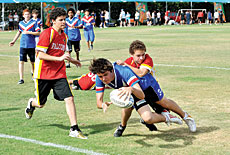JEDDAH: Jeddah Rugby Football Club’s open day last Thursday showcased the latent Saudi talent and enthusiasm for the game.
An afternoon of rugby union and league that saw teams from the British International School in Jeddah (BISJ) and the American International School in Jeddah (AISJ) in their traditional contest play some exciting football, proved conclusively that rugby is in the Kingdom to stay.
“The Saudi lads today have shown that they have what it takes to compete,” said David Kinkead jrfc’s fixture’s secretary. “They were a bit wary of the game six months ago but have remained with the sport, taken the knocks and stuck out the sometimes quite tough training. I take my hat off to them.”
Scott Macarthy, jrfc’s treasurer and membership secretary agreed saying that the day had proved a valuable experience for the club. “I think that rugby could have a real future in the Kingdom especially in the seven and ten–a-side games,” he suggested. “I get the impression football is palling somewhat as the sole mass spectator sport.”
The single competitive fixture, between bisj and AISJ was more evenly matched than in former encounters and was no foregone conclusion.
In a free running match that featured wide running and open rugby BISJ eventually emerged victors beating aisj 6 tries to 2 (24 points to 8). The other tries were scored by Osama Abdullah, Salman Abu Alnasr, Farid Abdul Wahab and Hasan Zazouk. For aisj inflicted injury with one try Liam McRaith and a second during the match was more consolation than damage.
It was in the Saudi development team games that the real surprises emerged. Just over a week ago, the invitation went out to schools across Jeddah inviting anyone under 16 to have a try-out game with JRFC.
The development games followed on with invitees and recently recruited Saudi players battling it out for dominance on the field.
The first round games provided an opportunity for players to show their skills and jrfc coaches selected individuals for a second round ‘best talents’ to play in a senior match to stretch their abilities against seasoned players.
“We had a very wide range of ages in the mixed match,” said Kinkead. “There were Saudis from 14 years old to 24 up against some very experienced players and they really shone.”
Fawaz Al-Aghee — the talented sprinter who featured at the Dubai Sevens last November for JRFC — ran in a series of tries with casual grace. However, this time he was not alone. Rackan (Rocky) Abdullah Alasirithe was awarded best tackler accolade, and provided a sparkling counterpoint to Al-Aghee with equal speed and jinking runs that made him all but impossible to catch once under way. The coaches’ notepads were busy when he hove into view with serious intent on the opposition’s goal line.
While Saudi players tend to be light, fast and agile, the inclusion of a bigger player in a sevens side can cause serious problems for the less substantial opponents as 16-year-old Rayan Alasiri proved to great effect. He is new to rugby but comes from a Saudi rugby environment — one of his brothers Mohammed (Big Mo) was a stalwart of the 2007 Saudi Scorpions and another is the formidable Rocky. He raised some appreciative eyebrows as he put in a fine exhibition of no-nonsense and very determined charges that proved extremely difficult to stop, taking up to four defenders — half the opposing team — to bring him down.
“Open up the defense with a guy like that and you’ve got it made,” observed one seasoned sidelined player.
Samir Anveerdeen a Sri Lankan but living in the Kingdom scooped the best new player award and Ali Barnawe the best try award.
The men’s tournament was won by the new ‘Scorpions’ that won all their games. The judging panel recognized Matthew Jay as the top try scorer, Richard Hickson and JP Greyvenstein as the MVPs and awarded try of the tournament to 14-year-old Jarrod Hickson who scored a great father-son combination try grounding an inch perfect kick from his father Richard.
Rugby has a large following in the three western international schools in Jeddah but is not yet on the Saudi national curriculum as a taught subject. Before the Kingdom can display its undoubted pool of young and very keen talent on the international stage, the international rugby union has to recognize the Kingdom as a rugby-playing nation and that requires it to be a taught subject in just a few schools.
More than one coach in Jeddah has the vision of seeing a Saudi national sevens team take the turf in Dubai in that most prestigious of tournaments the Dubai Sevens and put the Kingdom firmly on the world sporting scene.
It is possible and could be close; not long ago experienced rugby observers underestimated Argentina as a rugby nation and lived to nurse the bruises and rue the day when the South American team lifted the World Cup in March this year.


